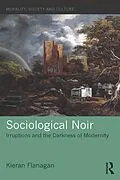Contrary to secular claims regarding the expulsion of religion, modernity does in fact produce forms whose understanding re-casts the relationships between sociology and theology. This book explores 'irruptions' which disturb modernity: fragments of history that have spectral - 'noir' - properties, whether ruins, collective memories, dark Gothic or the Satanic as manifested in culture. The study investigates what irrupts from these depths to unsettle our understanding of modernity to reveal its theological roots. A ground-breaking work, Sociological Noir explores literature, history and theology to re-cast the sociological imagination in ways that inspire new configurations in modernity.
Autorentext
Kieran Flanagan is Senior Research Fellow in the School of Sociology, Politics and International Studies at the University of Bristol, UK. He is the author of Sociology in Theology: Reflexivity and Belief (2007); Seen and Unseen: Visual Culture, Sociology and Theology (2004); The Enchantment of Sociology: A Study of Theology and Culture (1996); and Sociology and Liturgy: Re-presentations of the Holy (1991), and co-editor with Peter C. Jupp of A Sociology of Spirituality (2007); Virtue Ethics and Sociology: Issues of Modernity and Religion (2001); and Postmodernity, Sociology and Religion (1996).
Inhalt
Acknowledgements
Introduction
1. A sociology of gloom: initial forebodings
2. Collective memory: remembrance and the constitution of images
3. Ruins: irruptions in the fragments
4. Dark Gothic: life in the shade
5. Satan: modernity's imaginary friend
6. Sociology, sin and expiation
7. Sociodicy or theodicy? A matter of sociological choice
Conclusion
Appendix 1: Fingering apparitions: the sociologist and the vulgar statue
Bibliography
